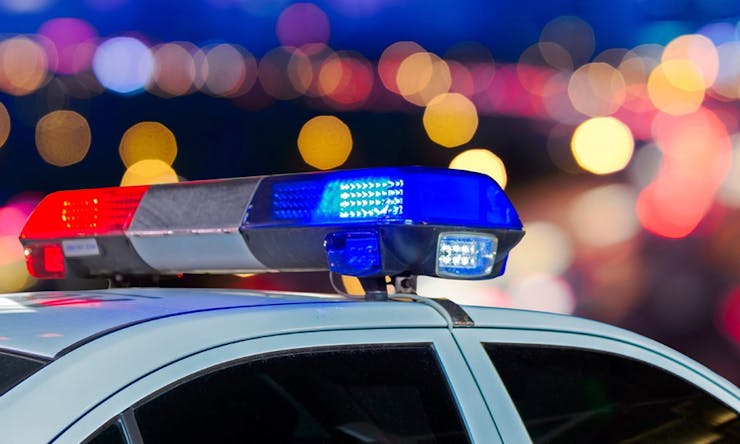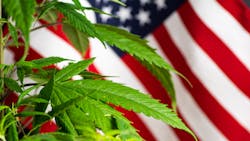“Part of what bothers me the most about whole the war on drugs is the sheer intellectual dishonesty of it,” Inge Fryklund says as she rattles off a brief history of prohibition. Cracking down on drug users can score political points or justify outsized police budgets, she continues, but rarely does it actually solve problems.
For five years, Fryklund worked as a prosecutor in the Cook County State’s Attorney’s Office. Living in Chicago her view on drug policy began to shift. Later she spent almost five years in Afghanistan working with the legal system and advising national, provincial, and municipal governments. In both areas, she saw violence and corruption — the unintended consequences of hardline prohibition. She’s now a member of the group Law Enforcement Against Prohibition, or LEAP.
Drugs carry risks, Fryklund acknowledges, but many of the consequences of the war on drugs stem from prohibition itself. Establishing a legal, regulated market, she argues, is the best way to minimize harm.
As part of Leafly’s ongoing effort to include the voice of law enforcement in the cannabis conversation, we spoke to Frykland about cannabis and prohibition. In the interview, she touched on the experiences that changed her mind on drug policy; the policies she’s paying attention to in Oregon, where she now lives; and why she thinks concerns about driving under the influence of cannabis are “bogus.” Here’s an edited transcript of the conversation:
Leafly: What experiences as a prosecutor encouraged you to take a public position on cannabis?

Inge Fryklund: I was a prosecutor in Chicago in the 1980s. At that time there was a great deal of gang violence. We were running about 900 murders per year. A lot of it was simply fighting over drug territories. This was kind of my first foray into anything having to do with drugs. I thought, Gee, drugs are bad. These people are dealing drugs, so they deserve to get locked up.
But over those five years, I saw more and more of the damage. One of the things that really struck me was that the vast majority of the people who were being arrested were black. And even though the drug use statistics are pretty similar across racial and ethnic groups, somehow all the criminal justice apparatus was coming down on lower-income and minority populations.
We’d also see the same people coming in month after month. I’d look at the rap sheets —multiple pages — all these arrests and convictions, mostly for drug offenses. And you knew that this person was never going to get a job in the legitimate economy. All we were doing was making it more likely that he was going to have to go back to the drug economy as the only income source. We were putting a lot of public resources into all this arrest-and-conviction machinery, but we weren’t changing the picture. If anything we were just making it worse because we were cementing people further into the drug economy.
Another thing I noticed was the police reports. Far too often the same thing was being cited: When police approached, defendant dropped a bag of something on the ground. Well, that seems pretty unlikely for defendants to be doing this, and we really got to wondering about the honesty of the police. The kind of impunity, lack of accountability, anything to get a conviction — the attitude that we’re seeing now in the Chicago Police Department — I think a lot of it has its roots going back a couple of decades to the war on drugs. Our war on drugs has promoted disrespect for the law on the part of the people who happily want to use marijuana, and it’s promoting disrespect for the law on the part of the people who are supposed to be enforcing our laws. This whole thing is just a lose-lose-lose proposition.
Things are certainly different today in Oregon, where you live now. What are you watching in terms of how legalization rolls out?
I was very involved in Measure 91 two years ago to get this legalized, and now we’re hashing out exactly how it’s going to work. It was only a few weeks ago that the Oregon Liquor Control Commission started taking applications for retail outlets. It’s just barely gotten off the ground.
Unfortunately, the law now says that cities and counties that voted more than 56 percent against Measure 91, can locally vote to prohibit [cannabis businesses]. And virtually the entire eastern half of Oregon has voted to prohibit it. That’s something not generally known.
I’ve noticed that, too. Even in legal states, a lot of municipalities seem to want to keep cannabis out. What’s your take on that?
A couple months ago I went out to Ontario, which is way east, almost to Idaho, to testify before their City Council. There were probably 150 people in the room, mostly elderly. I’m 69, so I’ve been fighting this one for a long time, but these people were impassioned about the damage caused by drugs. They talked about how they don’t want this in their community, they’ve got problems with heroin, therefore let’s ban marijuana. Very emotional arguments. We’ve so demonized drugs that it’s hard to get people to think about, “Hey, it’s the illegality that’s killing you.”
At that same meeting in Ontario, they voted to legalize two more liquor stores on Main Street — in a town of 11,000 — with no discussion. So there are huge cultural differences, and I suspect that’s going to take a while to change. It’s been helpful to see that the sky did not fall in Colorado. All these fears about all the terrible things that were going to happen [but] turned out not to happen! We’re digging our way out from under two generations of demonizing drugs.
Interesting what you say about illegality being the killer. Can you explain what you mean?
People see families and lives destroyed because of drug use. This is true. But how much of the problem or the inability to treat it is because it’s illegal?
When my son was a junior in high school in Chicago — he’s now 35, so this was a while ago — one of his classmates died of a heroin overdose. I and the other parents found out about it when we were invited to the memorial service. The kids knew something about this, but nobody talked to the parents. I don’t think 16-year-old kids understand either addiction or the finality of death or how it’s going to affect the family, but they sure know you don’t rat on your friends to the Chicago Police Department. This kid died of the war on drugs. If it had been something legal but really stupid, it could’ve been dealt with openly. He too now could be 35 years old and long since past whatever was upsetting him back then.
What about decriminalization?
Decriminalization is essentially what our policy was back during alcohol prohibition. It was perfectly legal to drink, you just couldn’t legally buy it. All the sales were by people who were criminals and had every incentive to adulterate their product.
One reason that prohibition of anything is a sheer fantasy — you know, “a drug-free America” — it’s like cats with catnip: They’re built to go for the stuff. If there is any substance on the planet which can be brewed, fermented, smoked, distilled, ingested, to produce some elevated effect, human beings have tried it. There’s some archeological evidence that we had the gene to metabolize alcohol 11,000 years ago. So humans are like cats. I can’t talk my cats out of going for the catnip, so the idea that somehow we can ban all of this or somehow remove it from the planet, you know, we would have to remove every single fruit crop, juniper berries, potatoes, rice, barley — you name it. It simply is not possible. Instead of pretending that we are some other species, let’s acknowledge the fact that humans tend to go for exciting stuff. Then figure out how to manage and regulate it so we minimize the damage.
There’s a lot of talk, especially by politicians, about “nonviolent” drug offenders. You don’t like that distinction. How come?
We keep hearing this phrase. It’s something I worry about us getting sort of hung up on, as though, Oh, nonviolent people are OK, violent people aren’t OK. But when a substance is illegal, this means that violence is inevitable. People cannot go to court to resolve their disputes. If you’re in a legal business, you go to court. You sue the other side and sort it out. But when it’s illegal, you have to turn to extrajudicial enforcement to resolve normal business disputes. During the 1920s, part of what Al Capone provided was enforcement services. In an illegal enforcement regime, there aren’t too many options about what to do. You can say please or break kneecaps, and then you shoot them.
I spent a good bit of my adult life in Chicago, and memories there are still current. The day prohibition was repealed, all the beer distributors with franchise area disputes took their cases to the circuit court of Cook County, and the mafia lost market share. So as long as we insist that not just marijuana but everything else be illegal, we can expect that there’s going to be violence. That’s just the way it works. We can’t say, “Oh, we’re going to keep it illegal but we won’t charge the nonviolent offenders.” There are always going to be some nonviolent offenders, but we’re going to keep generating an unending supply of violent defenders.
Instead of trying to draw a distinction between violent and nonviolent offenders, let’s just clean the whole thing up and let the marijuana dealers take their dispute to court and have legal contract enforcement.
There’s a lot of consternation arounddriving under the influenceright now. What’s your take?
I think it’s kind of a bogus issue, for this reason: Except for the occasional sweeps that police do where they’ll stop every single person at a roadblock to see if they’ve been drinking, there is no systematic screening of drivers to see what they’re high on. Instead, police pull people over if they’re weaving in and out of traffic, going too fast, or doing something erratic. So behavior is the trigger for stopping them.
I hear police in Oregon say, “Oh, we’ve got to have a test for this before we can have it be legal because we don’t want people driving while high.” That strikes me as just kind of an excuse to oppose marijuana. If people are driving erratically, pull them over. Get them off the road. But if you want to prosecute, that’s a different issue.
You said your experience as a prosecutor led you to your current stance. If they see what you see, why do so many other law enforcement officers still oppose legalization?
There are a number of reasons. A good rule in almost any investigation is: Follow the money.
You’re familiar with the 1033 Program, [through which] the Pentagon gives excess military equipment to state and local law enforcement. This was first authorized in 1997, specifically for fighting the war on drugs. Later on, an amendment reauthorizing it also added terrorism, but how many terrorism things are actually going on in small towns? Something like $4.3 billion has been passed out since ’97. And there are now small cities, like my small town of Bend, Ore., 80,000 people — police have got an MRAP. These are the mine-resistant, ambush-protected vehicles that were developed for Iraq.
I spent five years total in Afghanistan, where I was licensed to drive a Humvee. They’re a lot of fun. There’s a powerful incentive for people to get their hands on this stuff because it’s neat. They’re all kinds of fun to drive and makes you look, you know, like you’re part of the armed forces rather than some local police jurisdiction. You only get that if you can argue that you’re going to fight the drug war.
To be a little bit charitable, there are some police officers who genuinely see the problems that heroin has led to and think, my God, we’ve got to prohibit this. You get that if you are so up-close that all you’re seeing is day-to-day. You’re not seeing the forest for the trees. But if you step back a bit, most of these problems arise because of the illegality.
At the Drug Policy Alliance conference in November I really noticed the number of European countries that have gone to harm reduction and heroin-assisted treatment. Ever since ’94, the Swiss have allowed any self-described addict to go to a government clinic and shoot up with pharmaceutical-grade heroin. Their deaths and usage rates have dropped dramatically, HIV-hepatitis rates are way down, crime is down. And in the U.S., where we vigorously prohibit heroin and insist that people go clean, the latest figures I have my hands on are from 2013 when we were up to about 8,000 deaths a year from heroin. We’ve been running 3,000 to 4,000 for years, and now it’s spiked up. With a lot of those heroin overdose deaths, it’s not so much the heroin itself, it’s the completely unknown quality and potency. There’s so much stuff on the street that’s cut with whatever, because people in the illegal market, what the hell, they’re not going to be prosecuted by the FDA for adulterated product or consumer product labeling. So it’s the illegality that is driving a lot of our problems.
Image Souce: Inge Fryklund





